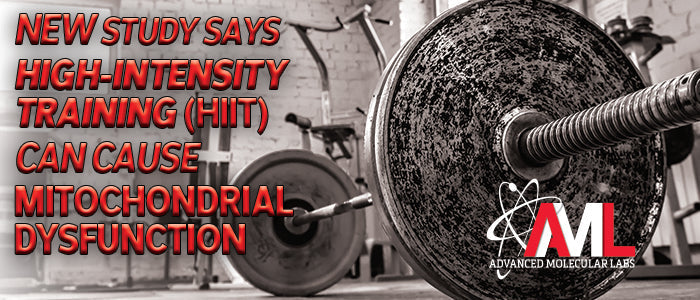


Mitochondrial Dysfunction: Insights on Exercise Science & Recovery
By Steve Blechman
The mitochondria are the engine powerhouses of the cell, generating energy by burning fat, sugar and certain amino acids from the foods we eat into ATP for proper cellular energy and function. Mitochondrial dysfunction could be caused by aging, oxidative stress, and energy metabolism. Mitochondria damage can cause insulin resistance and diabetes; increased body fat and obesity, lower exercise capacity, muscle strength and cognitive function. In a new study published in the March 18th, 2021 issue of the journal Cell Metabolism, a team of Swedish researchers reported that excessive high-intensity-interval training (HIIT) can cause mitochondrial dysfunction and insulin resistance. The researchers found that excessive exercise training induces substantial respiratory impairment and that mitochondrial impairment is associated with impaired glucose tolerance, highlighting the importance of understanding exercise science and exercise physiology in sports nutrition.
HIIT training involves short burst of high-intensity exercise interspersed with a few minutes of rest or lower intensity exercise to enhance recovery. Research has shown that the benefits and advantages of HIIT training is that you can get maximum health effects in the least amount of time. Studies have shown that high-intensity interval training can increase muscle mitochondrial biogenesis, protein synthesis and enhance mitochondrial function and cardiorespiratory fitness. But is more HIIT training better? Not necessarily, according to this new study. With test subjects performing HIIT training on a stationary bike, the researchers "used a training model with a progressively increasing exercise load during an intervention of four weeks." The researchers said, "we closely follow changes in glucose tolerance, mitochondrial function and dynamics, physical exercise capacity and whole-body metabolism. Following the week with the highest exercise load, we found a striking reduction in intrinsic mitochondrial function that coincided with the disturbance in glucose tolerance and insulin secretion. We also assessed continuous blood glucose profiles in world class endurance athletes and found that they had impaired glucose control compared with the match control group." During the study, the researchers performed muscle biopsies of the exercise subjects to measure mitochondrial function as well as glucose measurements to monitor insulin levels. The insulin resistance was similar to someone with diabetes. Also, mitochondrial respiration fell by an average of 40%. But oxygen consumption and power output levels improved. The shortcoming of this study is that it was small and only involved 11 adults that exercised regularly, but not competitive athletes. A larger study is needed over a longer period of time to see if the same results occur.
The bottom line is the health benefits of exercise are clear. High-Intensity interval training (HIIT) is safe and very effective workout for improving health and performance. It is not necessary to do HIIT training every day. Do HIIT training two to three times weekly, and on other days of the week do moderate-intensity exercise of longer duration to achieve optimum metabolic health, fat loss and aerobic fitness. To enhance muscle performance and post workout recovery after high-intensity exercise, take mitochondrial regulator and protector nutrients such as leucine (5 grams), creatine monohydrate (5 grams) and betaine (2.5 grams) as present in Advanced Molecular Labs (AML) Post Workout. Research has shown that these mitochondrial activators can help enhance and preserve skeletal muscle mitochondrial biogenesis and function, supporting overall mitochondrial health.
References:
1. Flockhart M, Nilsson LC, Tais S, Ekblom B, Apró W, Larsen FJ. Excessive exercise training causes mitochondrial functional impairment and decreases glucose tolerance in healthy volunteers. Cell Metab 2021; Mar 13:S1550-4131(21)00102-9. doi: 10.1016/j.cmet.2021.02.017. Epub ahead of print. PMID: 33740420.
2. Cell Press. How exercise - interval training in particular - helps your mitochondria stave off old age. ScienceDaily, 7 March 2017. www.sciencedaily.com/releases/2017/03/170307155214.htm
3. Matthew M Robinson, Surendra Dasari, Adam R. Konopka, Matthew L Johnson, S Manjunatha, Raul Ruiz Esponda, Rickey E Carter, Ian R Lanza, K Sreekumaran Nair. Enhanced Protein Translation Underlies Improved Metabolic and Physical Adaptations to Different Exercise Training Modes in Young and Old Humans. Cell Metabolism 2017; 25 (3): 581 DOI: 10.1016/j.cmet.2017.02.009
4. Leucine Modulates Mitochondrial Biogenesis and SIRT1-AMPK Signaling in CZC12 Myotubes. Nutrition and Metabolism, published online October 7, 2004.
5. Leucine supplementation increases SIRT1 expression and prevents mitochondrial dysfunction and metabolic disorders in high fat-induced obese mice. Am J Phsiol Metab, November 15, 2012. Hongliang Li et al.
6. Leucine Supplementation: A Novel Strategy for Modulating Lipid Metabolism and Energy Homeostasis. Nutrients, May 2, 2020. Lingyu Zhang et al.
7. Modulation of Energy Sensing by Leucine Synergy With Natural Sirtuin Activators: Effects on Healthspan. Journal of Medicinal Foods, November 6, 2020. Michael Zemel.
8. Betaine increases mitochondrial content and improves hepatic lipid metabolism. Food Function, December 4, 2018.
9. Betaine enhances the cellular survival via mitochondrial fusion DRP1. Animal Cells and Systems, published online August 30, 2018.
10. Leucine regulates slow-twitch muscle fiber expression and mitochondrial function by SIRT1/AMPK signaling in porcine skeletal muscle satellite cells. Animal Science Journal, February 2019, Xiaoling Chen et al.
11. Leucine modulation of mitochondrial mass and oxygen consumption in skeletal muscle cells and adipocytes. Nutrition & Metabolism, published online June 5, 2009. Xiaocun Sun and Michael B Zemel.
12. Betaine is a positive regulator of mitochondrial respiration. Biochemical and Biophysical Research Communications, published onlne December 8, 2014. Icksoo Lee.
13. Enhanced mitochondrial biogenesis is associated with ameliorative action of creatine supplementation in rat soleus and cardiac muscles. Exp Ther Med, January 2020.
14. Creatine supplementation reduces skeletal muscle degeneration and enhances mitochondrial function in mdx mice. Neuromuscular Disorders, February 2002. Anne-Catherine Passaquin et al.
15. Effects of creatine supplementation on muscular strength and body composition. Medicine Science Sports & Exercise, March 2000. MD Becque et al.




